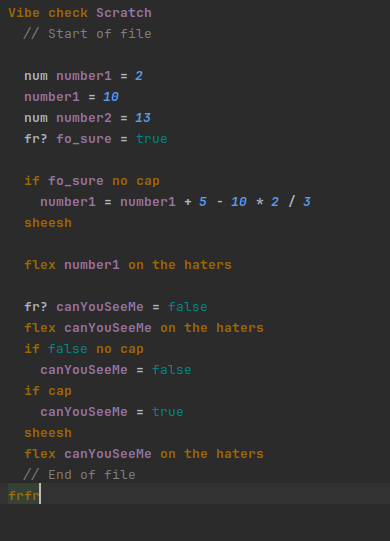Is this LOLCODE 2.0?
Programmer Humor
Welcome to Programmer Humor!
This is a place where you can post jokes, memes, humor, etc. related to programming!
For sharing awful code theres also Programming Horror.
Rules
- Keep content in english
- No advertisements
- Posts must be related to programming or programmer topics
Why aren’t the booleans like “facts” or “no cap” for true and cap for “false”?
Also, you could have exceptions be called “Sus”
Because it was easier to use Java primitives than implement the constants myself.
I swear, Zoomers are like the steve buscemi "fellow kids" meme, but somehow everyone in the scene is young
Anyway, nice compiler. Might feel basic to you, but writing a back end for a low level IR format is not that much harder.
It’s really cool, but the example doesn’t produce any sensible output? If you have created something like this, why wouldn’t you have your demo output something sensible like Fibonacci or 1337 or whatever.
Great idea if I have to extend it
I'm opening an issue on your ticket tracker to add filesystem i/o. Let the nightmare commence
It's so beautiful!
Now I'm thinking about how to alias "flex X on the haters" into other development environments...
Is flex X on the haters a way of logging to console?
Yes, it pretty much just wraps the expression in a "System.out.println();"
Maybe "flex X" outputs to stdout and "flex X on the haters" outputs to stderr?
I like the way you think! 😂
I'm curious to know how your language throws and catches errors :)
flex X on the fools does verbose logs only.
Does it compile into JVM bytecode or Java source code?
JVM bytecode is one of the most infuriating IRs I ever had the displeasure to work with, and if you managed to make a compiler for that, I applaud you.
Fortunately I generate Java source code from it. However MPS generates both source and byte code when you build the solution. For some reason I can't get the byte code to run though, but the source code does, so I don't care too much.
That sounds about right for JVM bytecode... In any case, great work!
No cap is cracking me up. This is great stuff
Oh metaprogramming! I'm doing a dissertation on this.
Very cool, I'd be interested in your publications once you're done. I like metaprogramming, but once you realise you might have needed it, you're already knee deep in fresh legacy code.
You essential have a compiler written through metaprogramming. For your implementation, did you use a find and replace or did you define and parse a grammar like a true compiler.
MPS uses projectional editing. Which means for the user that everything you do is free from concrete syntax, and you basically edit a graphical representation of that abstract syntax tree directly, while it looks like you're in a textual editor.
So I define abstract nodes that may have certain relationships with each other and then give them a representation in the editor (which is what you see in the screenshot). These nodes may also have generators assigned to them, which use map/reduce operations to generate whatever source code I desire. It usually includes its own bit of code, and triggers code generation of its children as well.
I hope that was somehow clear 😄
That's cool but also makes me cringe.
